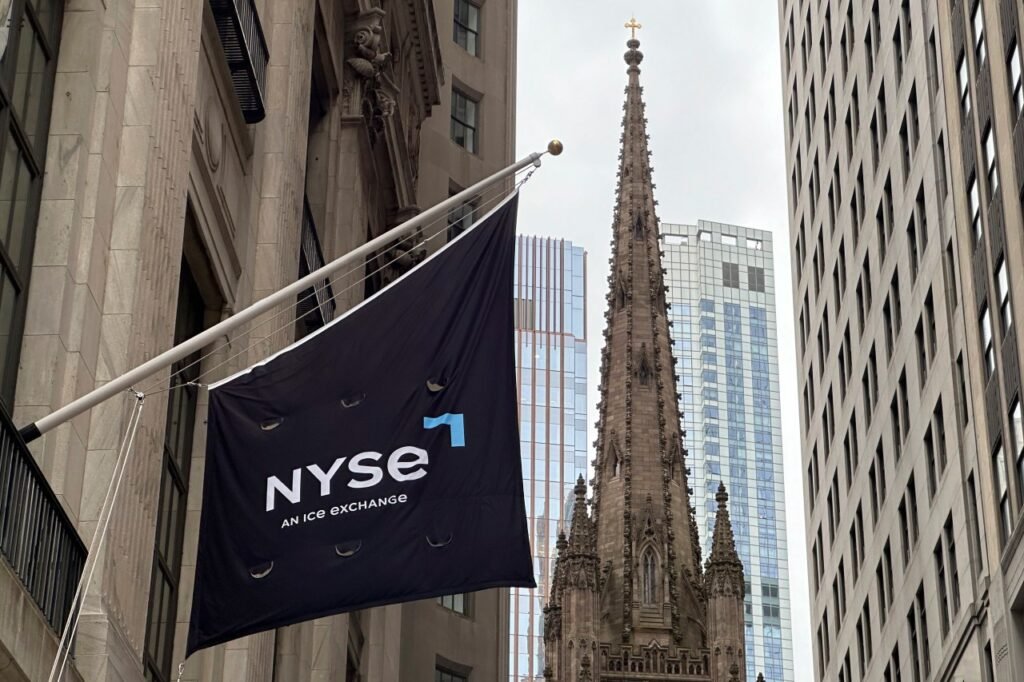
FILE – A flag flies beside the New York Stock Exchange in New York, Thursday, May 16, 2024. Trinity Church is seen in the background. (AP Photo/Peter Morgan, File)
NEW YORK (AP) — Technology stocks rallied on Nvidia’s strong earnings report, coupled with weakness elsewhere in the market on Thursday, keeping U.S. stock indexes mixed. In the latest example of how good news for the economy isn’t always good for Wall Street, the upbeat economic report is raising concerns about interest rates remaining high.
The S&P 500 was up 0.2% in midday trading. Gains in technology stocks helped the Nasdaq Composite Index rise 0.8% as of noon Eastern time. The Dow Jones Industrial Average, which is not weighted toward technology stocks, lagged the market, losing 255 points, or 0.6%.
Nvidia soared 10.4% after releasing its latest knockout earnings report late Wednesday. Sales for the most recent quarter increased 262% year-over-year, while profits increased an astonishing 629%. The company’s chips help train artificial intelligence systems, and demand is strong.
Nvidia also increased its dividend after CEO Jensen Huang touted that “the next industrial revolution has begun.”
There are growing concerns that Wall Street’s enthusiasm about the potential of AI is creating a bubble that makes prices too high and expectations too stringent.But Nvidia’s continued rapid growth, which has made it one of the most influential stocks on Wall Street, has only served to boost other stocks even further.
Supermicro Computer, which sells server and storage systems used in AI and other computing, rose 3.1%, bringing its year-to-date gain to nearly 217%.
News Corp. shares rose 1.3% after it announced a deal to transfer content from The Wall Street Journal, the New York Post and other news businesses to OpenAI.
But most Wall Street stocks fell as pressure from bond market yields intensified, and reports that the U.S. economy remains strong forced traders to rethink bets on when the Federal Reserve could cut interest rates and provide relief to financial markets.
The Fed is trying to accomplish the difficult feat of slowing the economy through high interest rates enough to keep inflation under control, but not so much as to force a painful recession, which has kept its key interest rate at its highest in more than two decades and has Wall Street clamoring for some easing.
Traders have already backed away from their earlier, overly optimistic forecasts, and if the economy performs better than expected, the Federal Reserve could wait longer before cutting rates. Even worse, it could force the Fed to eventually raise rates further, sparking a deep recession and causing inflation to collapse altogether.
Expectations remain high for at least one rate cut this year, but traders tempered some of those bets after a preliminary report on Thursday suggested U.S. business activity was growing at its fastest rate in more than two years. S&P Global said business growth improved not just in the services sector but also in hard-hit manufacturing.
Meanwhile, another report showed that the US job market remains strong despite high interest rates. Fewer workers filed for unemployment benefits last week than economists expected, indicating layoffs remain relatively low.
Treasury yields were roughly flat after the unemployment report but turned higher immediately after the business activities report, also suggesting that selling prices remain elevated.
“What is interesting is that the main inflation driver is coming from manufacturing rather than services, meaning that cost and selling price inflation are slightly higher in both sectors compared to pre-pandemic norms. , suggesting the Fed’s last mile to 2% target remains elusive, said Chris William, chief business economist at S&P Global Market Intelligence. Mr. Song says.
The yield on the 10-year Treasury note, which helps set interest rates on mortgages and other loans, rose to 4.48% from Wednesday’s close of 4.43%. The yield on the two-year Treasury note, which is more reflective of expectations for Federal Reserve policy, rose to 4.93% from 4.87%.
One of the sharpest drops on Wall Street was Live Nation Entertainment, whose stock fell 6.6% after the Justice Department accused the company and its Ticketmaster business of illegally monopolizing live events in the country. did.
VF Corp., which operates brands such as The North Face, Vans and Timberland, fell 4.9% after it reported a loss in its latest quarter on top of a weaker-than-expected sales decline than analysts expected.
Utility stocks also tumbled. When interest rates are high, bonds pay more interest, which could scare away income-seeking investors who would otherwise buy utilities for their high dividends. American Water Works fell 2.9%.
In overseas stock markets, indexes were mixed in Europe and Asia. Japan’s Nikkei Stock Average rose 1.3% as semiconductor-related companies performed well following Nvidia’s strong profit report. The index fell 1.7% in Hong Kong and 1.3% in Shanghai amid questions about whether new policies to support China’s ailing real estate sector will be enough to end the industry’s crisis.
___
AP Business Writers Yuri Kageyama and Matt Ott contributed.

